Current Article ∙ Archive ∙ Back to Island Voices
Osteoporosis: Possible Causes
By Dr. Margret Holland, B.Sc., N.D.
Osteoporosis is a condition that is much written about these days. It is defined by Wikipedia as: a disease of bone – leading to an increased risk of fracture. In osteoporosis the bone mineral density (BMD) is reduced, bone micro architecture is disrupted, and the amount and variety of non-collagenous proteins in bone is altered.
As we can see from this definition, bone health incorporates much more then the presence of calcium in the diet. It involves the body’s ability to absorb and deposit various minerals into the bone matrix. This process may be altered by any number of factors within the body.
We must first consider what the role of the bone is in the body. First it acts as a mineral reserve for various chemical reactions in the body. Second it acts as a structural support for the body and it also provides the attachment points for tendons and ligaments thereby enabling movement of our bodies.
Bone is a living tissue that is constantly being remodeled dependant on the stresses and strains to which it is subjected. It is also broken down when the body requires the minerals stored in bone for other functions. It is built up when there are excess minerals present in the blood.
Let us first consider the aspect of remodeling to the stresses and strains. This particular ability is why exercise is so important for improving bone density. The exercise must be weight bearing in order to have maximum benefit. The body is a wonderful organism that constantly monitors what is required of it and it adapts to meet these needs. Exercise of the weight bearing type results in a stronger bone matrix.
Now let us consider the aspect of the bone being a mineral reserve. Our body uses the various minerals found in the bone for a great number of different chemical reactions. The place that the body monitors most closely for minerals is the blood. Should the blood be deficient in a particular mineral, the bone will be used to supply the appropriate amount and type of mineral. If the dietary content and absorption of a mineral is sufficient to maintain adequate levels in the blood then the bone will not be broken down, in fact excess minerals will actually be deposited into the bone allowing for improved density.
From this we can see that it is important to ensure adequate mineral concentrations in the blood in order to support bone density.
Here is where it gets tricky, blood mineral concentrations are not just dependant on dietary intake they are also dependant on absorption. We could consume vast quantities of minerals but if our gastro-intestinal system is working at less than optimal levels much of these dietary minerals will be excreted before ever even making it into the blood let alone being deposited in the bone.
Many people suffer from a condition called hypochlorhydria. This is a situation whereby the stomach is not secreting enough hydrochloric acid to adequately digest food. With this condition, calcium and other minerals are not broken down sufficiently to be absorbed into the blood stream. Reduced gastric acids are quite common in postmenopausal women.
Other conditions that may predispose to osteoporosis are thyroid or parathyroid disease. These two glands play an active role in monitoring blood calcium levels and if they are not functioning properly bone mineral density may be compromised.
The kidneys are also called into play when discussing bone density. It is at the level of the kidneys that calcium is excreted. Should kidney health be compromised then precious calcium may be excreted.
Calcium is absorbed at the level of the intestines. Diarrhoea, Crohn’s, Irritable Bowel Syndrome and other bowel diseases may all impede mineral absorption into the blood. Recall that reduced blood mineral concentrations will result in these minerals being leached from the bones.
Furthermore we have the action of Vitamin D on calcium absorption. This vitamin is turned into its active form at the level of the liver and kidneys. Disorders of these two organs will again negatively impact bone health.
As we can see from the above there are many possible influences to bone density (and I haven’t even discussed them all). While taking calcium supplements and participating in weight bearing exercises may be a good place to start, this should not be considered to be final answer to improving bone health.
Please consult with a qualified Naturopathic Physician in order to determine what steps may be taken to optimize your bone health.
Dr. Holland, B.Sc., N.D. practices in beautiful Qualicum Beach.
Her office is located at #3-702 Memorial Avenue, Qualicum Beach, British Columbia.
She may be reached at 250 752 2732.

